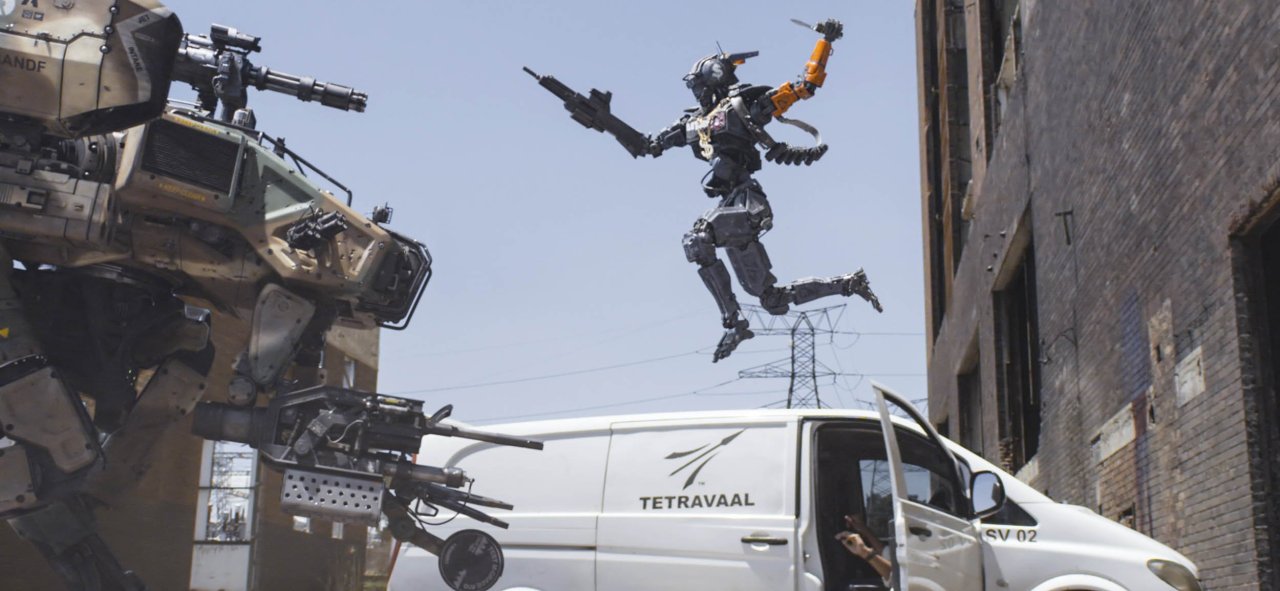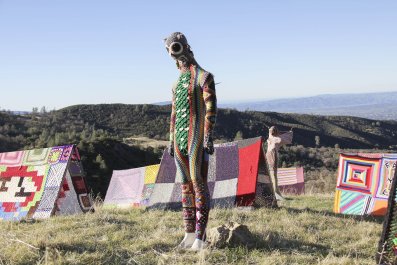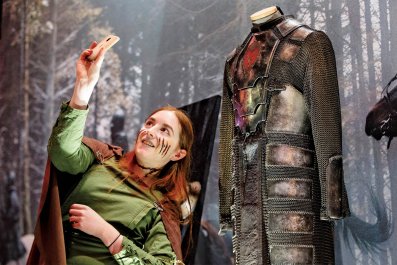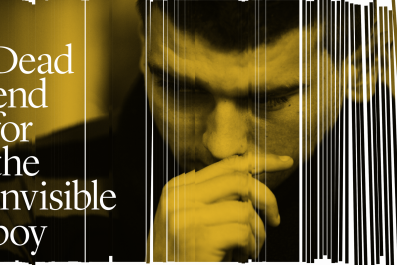Watching Chappie, the latest sci-fi-film-with-a-moral by South African director Neill Blomkamp, will be a disorienting experience for some viewers. Superhero Hugh Jackman stomps through scenes as a baddie with cargo shorts, a thick Australian accent and a thicker mullet. South African rap-hip-hop band Die Antwoord play musicians-gangsters. And the film's title character is an eerily life-like robot who makes E.T. look like a hardass. Bring on the weird.
But Chappie also touches on a few issues that give it an air of seriousness, including crime, automated warfare, police brutality and artificial intelligence. Beneath the film's explosive visual effects, comic elements and frenetic pace, lies a disillusionment with how cruel humanity can be. As Blomkamp puts it, are robots "capable of being more human than the humans around them?"
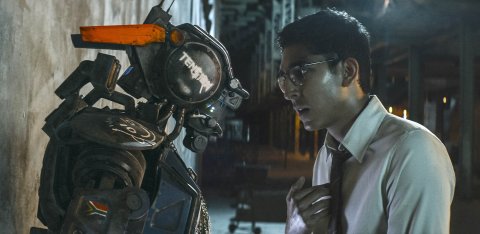
Chappie, which opens in theaters March 6, depicts a dystopian Johannesburg driven to desperation by crime. The city eagerly adopts a proposal to augment local police with "Scouts"—droid police—to beat back the criminals. The Scouts are the brainchild of young, earnest scientist Deon Wilson (Slumdog Millionaire's Dev Patel) and manufactured by defense company Tetra Vaal, headed by CEO Michelle Bradley (Sigourney Weaver). Wilson's real interest is testing if robots can be made sentient.
Wilson is routinely bullied by Vincent Moore (played with glee by Jackman), a boorish colleague whose own droid invention, a giant, over-engineered and missile-equipped robot called the "Moose" is shelved by police for being too terrifyingly militant. They'd much rather deal with Wilson's rabbit-eared, easily controllable Scouts.
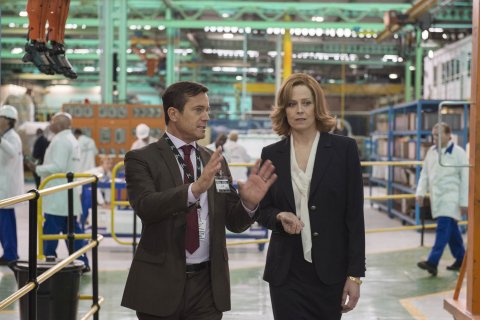
When one of those Scouts is marked for the scrap heap, Wilson decides to test out his sentient program, stealing the Scout from the Tetra Vaal complex (which has surprisingly lax security for a defense corporation). His plans are abruptly changed when he is hijacked by Ninja and Yolandi Visser (a.k.a. Die Antwoord, playing versions of themselves) who are deeply indebted to a local criminal and want to force the Scouts' creator to program one of his robots to help them with a heist.
Under duress, Wilson reprograms the robot with a consciousness, birthing a naif they call Chappie who quickly proves to be a foil for the broken humanity around it: "A piece of intelligence and sentience that's clean and uncorrupted…a blank slate born into what I view as a hostile world," Blomkamp says of Chappie. A nurturing tug-of-war ensues between Wilson, who wants to teach Chappie to paint and emote, and Ninja, who needs Chappie to be more gangster. Caught in the middle is Visser, a maternal figure who feels responsible for protecting the robot's innocence.
If this synopsis sounds over the top, that's because it is. It works though, because Blomkamp doesn't pause to philosophize. Moore, for example, is a rugby-ball-toting villain clad in khaki shorts with a distaste for robotic sentience. His dialogue is littered with Australian slang, some of which Jackman didn't even know existed until he and Blomkamp Googled Australian phrases and came up with "frog in a sock" and "smart as a dunny rat." The crew "had so much fun with the character," Jackman says. "I remember at one point saying to Neill, 'Are we having too much fun here?'"
The film's strangest element is the casting of Die Antwoord, the rap duo that has found global success with their graphic videos and over-the-top lyrics, sung in a blend of Afrikaans and English. "There's a strangeness to the movie, an off-kilterness that I think they bring that I really like," Blomkamp says.
The original idea for Chappie stretches back to a video shot by Blomkamp in 2003 showing a rabbit-eared robot patrolling the streets of Johannesburg. Another of his short films, 2006's "Alive in Johannesburg," provided the outline for what became Blomkamp's hugely popular 2009 feature District 9, about aliens stranded in South Africa's financial capital. Blomkamp followed that up with 2013's Elysium, starring Matt Damon and Jodie Foster, which was mocked by some critics but raked in almost $300 million worldwide.
District 9, which earned four Academy Award nominations, used the bleak settings of the South Africa's squatter camps as a backdrop for a story of aliens-turned-refugees. Blomkamp says he was reluctant to return to his native country for Chappie for fear of repeating himself and he initially set the story in a North America location. But he struggled to remove the uniquely South African Die Antwoord from their "native environment" in a way that made sense, so he tried "to create a different version of Johannesburg" than the one in District 9—filming mainly in the suburbs or outskirts instead of the townships, avoiding the shacks and peppering the film with characters from around the world in an attempt to "Americanize" it.
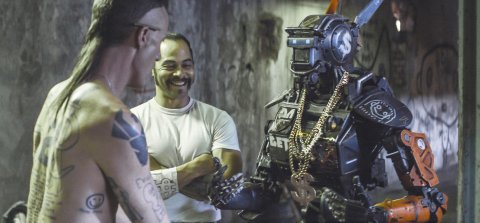
As with District 9, this film isn't an advertisement for Johannesburg Tourism. It plays up some of the biggest challenges facing the country: crime, grinding poverty and crumbling infrastructure. The film is bound to piss off locals, acknowledges Blomkamp, who left the country for Canada when he was 18. But the flipside, he says, is that some aspects of the film, such as the ever-present specter of crime, will resonate with South African audiences. "When I gave the script to the financiers, they viewed the idea of autonomous robots in South Africa as a totally, completely satirical idea," Blomkamp says. "The irony is that if you take that idea to South Africa," which suffers from one of the world's highest crime rates, "you probably have [a majority] of the population agree that it's a good idea." Robots "cannot be corrupted, you can't bargain with them when you get pulled over, you can't [bribe them to] not get a speeding ticket."
Blomkamp is known for his crisp visuals and frighteningly realistic special effects. Sharlto Copley—a recurring star in his films who has also starred in The A-Team and Maleficient—played the role of Chappie, acting live with the other actors. It was only later that the post-production team inserted the robot into the action, using real-life as well as digital models. The process has lent the robot shockingly lifelike qualities.

After a recent press screening in New York, one attendee complimented Copley on his depiction of the innocent and abused Chappie, saying there were moments when she left the theater "because it was breaking my heart."
"The movie has much to say to us in terms of what it is to be human," says sci-fi veteran Weaver. "That word, human, is a hard word to define now. There's so many inhumane acts in the film perpetrated by humans, not perpetrated by robots. I love how [Blomkamp] has this cauldron going of all these important issues underneath a very entertaining movie."



